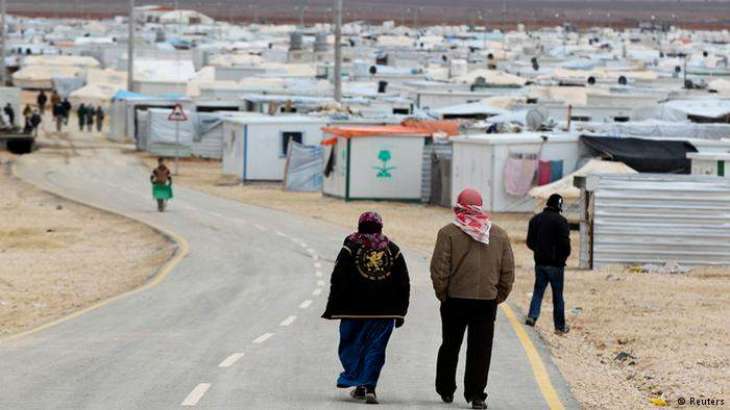The Zaatari refugee camp in northern Jordan has turned into a city-like settlement and is currently home to some 80,000 Syrians who have fled their homes due to the civil war.
AMMAN (Pakistan Point News / Sputnik - 13th August, 2018) The Zaatari refugee camp in northern Jordan has turned into a city-like settlement and is currently home to some 80,000 Syrians who have fled their homes due to the civil war.
A Sputnik correspondent visited the camp to find out the refugees' plans for the future.
The camp, located near the Syrian border in the Jordanian province of Mafraq, was built in 2012, one year after the start of the civil war in Syria, and currently occupies an area of over 5 square kilometers (1.9 square miles). Up until 2015, the camp was home to more than 125,000 people, mostly coming from southern Syria.
About three years ago, Jordanian authorities and international organizations set up two new refugee camps in northern Jordan to reduce overcrowding in Zaatari.
According to an official from a UN-accredited humanitarian organization, Zaatari is an "exemplary" camp which has 32 schools, hospitals, as well as a supply of water and humanitarian aid.
Moreover, refugees receive a food allowance of 20 Jordanian dinars (roughly $30), a tiny amount for Jordan. But the camp does host regular public events where Syrians can earn some money. However, individuals are not allowed to work for more than three months because the number of applicants significantly exceeds the number of job opportunities.
Accompanied by a police officer, the Sputnik correspondent visited a market located on Zaatari's main street. Many of its shops have glass windows and sell a wide variety of goods, including party clothing and mobile phones.
"I fled Daraa [a city in Syria] when the war broke out. My family has been living here for seven years. I opened this shop two years ago ... The Jordanian government is doing its best to ensure good living conditions in the camp," the owner of a shop selling outdated electronic devices said.
Asked about his prospects for returning to his home country, he responded positively.
"But the war destroyed my house. The [Syrian] army has taken control of the village just recently, and we do not know what the situation is like there. Nobody can guarantee our safety at the moment, and I cannot risk my familys well-being," the shop owner said.
At a candy shop nearby, a smiling young man with a beard offer his customers a piece of baklava. He moved to Jordan with his parents at the age of 11.
"I really want to go back home. But for now, the employees of the UN Refugee Agency cannot confirm that Syria is completely safe. Moreover, I will probably have to serve in the [Syrian] army but I have to work to feed my family," the young man said.
Every Syrian man aged 18 and older is subject to compulsory military service. Many Syrians have returned home to fight terrorists in their home country.
An owner of a second hand clothing store seemed to be more determined to return home than his younger colleagues. He has a family of 15 and is also from Daara.
"We could leave as soon as tomorrow. Nothing is keeping us here. Our Jordanian brothers gave us a helping hand, shared their bread with us ... Once we are guaranteed safety and provided with an opportunity to return, we will be the first to do so," he said.
Southern Syria was proclaimed free from terrorists about a week ago. The army now controls three provinces: Daraa, Suwayda and Quneitra. In most of the towns, the militants surrendered without a fight and agreed to a truce and amnesty. Some Syrian families from border towns have already returned home via border crossings that were previously used by smugglers.
Some 1.5 million Syrian refugees currently reside in Jordan, the majority of whom work in major cities. Some of them, like entrepreneur Adnan Habbab, have already returned to Syria. He managed reopened a small hotel in the historic center of Damascus, which used to be a popular tourist destination before the war.
In Amman, the correspondent spoke to local parliament member Haled Ramadan. His father is a refugee who left Palestine in late 1940s. Black and white photos in Ramadan's house show the past as well as Palestinians fleeing a Yarmouk refugee camp located near Damascus.
"As of today, thousands of unregistered citizens in Jordan are trying to get [their documents] legalized through international organizations since they want to get international guarantees of safety and decent living conditions upon their return to Syria," Ramadan said.
He added that this is about the return of some 2 million people.




